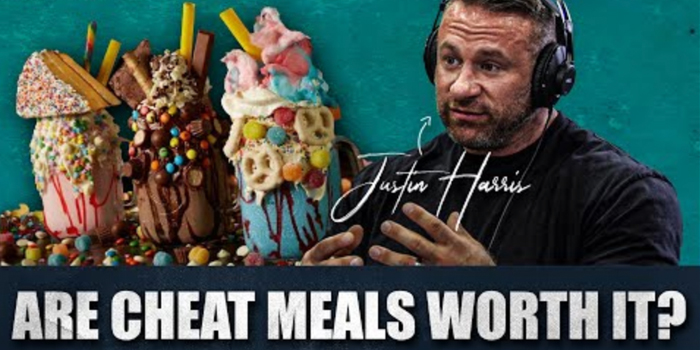
“Do you find purpose in cheat meals? Guys like Branch Warren claim it’s an excuse to eat shitty food. Is there any real meaning behind them?”
Nutritionist Justin Harris agrees with Branch’s claim — it is an excuse to eat shitty food. But at the same time, Branch has been competing since the early ‘90s. Surely since then, he’s had to have eaten at least one cheat meal.
“Do you think he’s never had a cheat meal in 30 years?”
In Justin’s expertise, it’s OK to have a cheat meal every so often. Sometimes you’re in a bad place mentally, emotionally, or physically, and you just need to treat yourself once a week or so, that’s fine. If that one cheat meal is what gets you through the week of clean eating or whatever diet you’re on, go for it.
It’s better to have one scheduled cheat meal a week than to go off of the program and eat on a day that you’ve burned off a lot of calories and now have taken in more calories than lost. Don’t turn a fat-burning day into a fat-gaining day. That can ruin an entire program.
But if you have one cheat meal a week, that could become one pound of fat a month. For a four-month contest prep program following this cheat meal rule, you’d end up with four pounds of fat. That might sound like a lot, but four pounds of fat really is not a lot.
“Take Ronnie Coleman on stage and add four pounds of fat on him. He (still) looks like Ronnie Coleman.”
Of course, that’s assuming a worst-case scenario, and said scenario probably won’t make a different on-stage.
But let’s say that you are doing your best to have absolutely no cheat meals during contest prep and three times during that prep period, your fat burning day turns into a fat storage day because you caved and had an unplanned cheat meal. From that, maybe you’d gain six pounds of fat, which is worse than adding four pounds of fat from having planned cheat meals.
Dave Tate adds that in order to have planned cheat meals, you have to be in a certain mental state. He admits that for him, trying to have a cheat meal scheduled once a week would’ve been a disaster for him.
In response, Justin clarifies that he has a narrow focus on bodybuilders, so scheduling a cheat meal once a week is not something that’d work for everyone.
If this was a scenario in which someone was trying to eat clean, that is, eat healthier, in order to lose weight, that requires a calorie deficit, a circulatory exercise in your program — not necessarily cardio, but something that gets blood pumping — and be compliant and that more than 50 percent of the food you eat is nutrient-dense.
That’s pretty much all it takes to lose weight, but people don’t want to believe that. They’ll play dumb when it comes to nutrition, even when they know what it involves for losing weight.
“People want to convince themselves that they don’t know, but they know.”
Justin tells his clients to go to a restaurant and order what looks the healthiest on the menu out of all the options they’re thinking about ordering. Just doing that will get you moving in the right direction. If they’re stuck between steak, ribs, and fried fish, they probably know that fried foods are not good for them; ribs aren’t so great, either; so that narrows it down to steak.
“You don’t need to eat healthy (to lose weight). You really don’t. There’s a big difference between health, the way you look, eating healthy food, and weight loss. You have to decide where your markers for health are. If your marker for health is longevity, then all that really matters is calories.”













